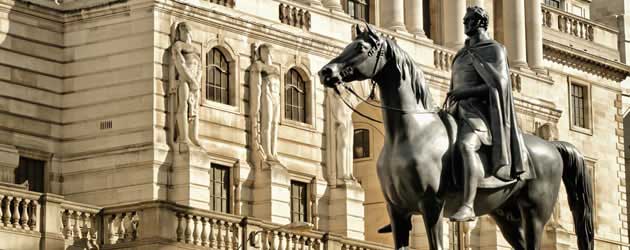
Bank of England policymaker Paul Tucker said yesterday that he supports further quantitative easing if it will help to bring down the value of the Pound.
The Pound to Euro exchange rate declined by around -0.2 cents overnight as Asian traders took GBP/EUR as low as 1.1556.
Demand for Sterling has remained very poor this week in light of Moody’s decision to strip the UK of its prized triple-A credit rating. The Pound struck a 31-month low of 1.5074 (GBP/USD) against the US Dollar at the beginning of the week, and a 16-month low of 1.1346 (GBP/EUR) against the single currency.
However, Sterling clawed back some of its losses on Monday as traders reacted to news from Italy that no single political party gained enough votes to form a stable government. The election results raised the prospect of Italy backtracking on its fiscal consolidation targets, and led to a bout of risk aversion, which saw the Pound appreciate by around 2.4 cents against the Euro.
As long as political concerns have a grip over the Eurozone, the Pound may be able to avoid a fresh set of substantial losses. Nevertheless, the UK’s dire cocktail of soaring inflation and stalling wage growth, combined with a Central Bank that seems increasingly keen on more monetary easing, means that further Sterling slides remain a strong possibility.
The latest comments to damage demand for GBP came yesterday afternoon as BoE Deputy Governor Paul Tucker said that he remains “open to more QE, depending on the outlook for demand and inflation”. Tucker went on to suggest that the Bank of England’s asset purchasing scheme would have a stronger effect this year, due to the greater stability that exists in the global marketplace.
Tucker confirmed that the BoE are committed to bringing down inflation to around 2.0% in the medium term, but indicated that higher rates of inflation would be tolerated in order to oil the British economy with further quantitative easing measures.
Investors were particularly interested in Tucker’s comments regarding the Pound’s exchange rate: “we believe that the real exchange rate needs to fall, compared with where it was a few years ago, to get the necessary rebalancing in the economy”. GBP/EUR sunk following the statement and further Sterling weakness is expected if the Bank of England do decide to embark on a new round of asset purchases.
The Pound was down -0.5 cents against the US Dollar yesterday, -0.6 cents against the Canadian Dollar, and -1.1 cents against the Japanese Yen. However, against the risk-correlated Antipodean currencies Sterling managed to post a stronger performance. GBP/NZD grew by 1.1 cents and GBP/AUD rallied by 0.3 cents as riskier assets came under selling pressure in response to the Italian election fiasco.
This morning’s British GDP report is expected to confirm that the UK economy contracted by -0.3% during the fourth quarter of 2012, but any downward revisions could add further misery to Sterling’s woes.

Comments are closed.